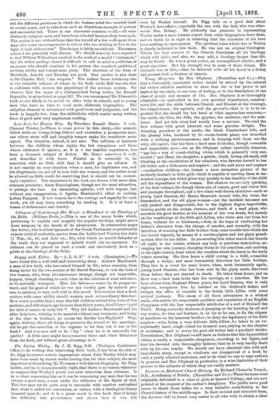Young Musgrave. By Mrs. Oliphant. (Macmillan and Co.)—Pity that a
thoroughly successful writer should be stirred by the natural but rather childish ambition to show that his or her power is not limited by ono style, or one tone of feeling, or to the description of one class of people and manner of life. Mrs. Oliphant is so thoroughly admirable—so unrivalled in her own peculiar department, country- town life, and the strife between Church and Dissent at the vicarage, the chapel-house, the squire's, and the grocer's—that it is to be re- gretted that she should try her hand at what approaches romance,— the castle, the lake, the fells, the gypsies, the madman, and the mur- derer. And yet this story had nearly been a success. We read the first volume with great pleasure and some genuine delight. The decaying grandeur of the castle, the bleak Cumberland fells, and the gleamy lake, bordered by its storm-beaten pines, are described with a striking picturesqueness; and in keeping with them are the wiry, old squire, who has been a hard man in his day, though venerable and respectable now,—for as Mr. Oliphant rather cynically observes, "age has a way of counterfeiting virtue which is generally very suc- cessful ;" and Mary, his daughter, a gentle, timid, loving old-maid, still blushing at the recollection of her admirers, who devotes herself to her old father and a little niece and nephew ; and the said niece and nephew —motherless children—the former a most attractive picture of the motherly instinct in little girls which is capable of nerving them to un- wonted courage, but which gives way quickly to the timidity of the child and the dependence of the woman. But observe we are only speaking of the first volume, for though there are, of course, good and clever bits and passages throughout, and a few other well-drawn sketches—such as young Lord Stanton, Sir Henry Stanton's second wile, the vicar, the dressmaker, and the old gipsy-woman—yet the incident becomes not only painful and disagreeable, but to the highest degree improbable, turning partly on the escape, capture, and death of a inad gipsy, who murders his good brother at the moment of his own death, but mainly on the wanderings of the little girl, Lilies, who twice sets out from her home, without let or hindrance,—first, in the hope of vindicating her father's character from the charge of murder, and secondly, with the intention of rescuing hor little brother from some trouble into which she has learnt vaguely, by means of a carrier-pigeon and her gipsy grand- mother, that he has fallen. In prosecuting this latter search she travels all night in the winter, without any help or previous instruction, ar- ranging her own journey, changing trains at the junctions, and arriving at the right station, from which she wanders about the lanes in the early winter morning. She then hears a child crying in a field, scrambles through a hedge, and most fortunately discovers her little brother.. They live in a wood for some hours, when, most fortunately again, young Lord Stanton, who has been sent by the gipsy uncle, discovers them before they are starved to death. He takes them home, and on their way a dark man looks into the carriage, at a junction. He has been absent from England fifteen years, but Lord Stanton, who is only eighteen, recognises him by instinct as the children's father, and resigns the office of consoler to the lovely little Lilies with some natural jealousy. The cause of all these adventures is a wicked uncle, who unites the respectable qualities and reputation of an English clergyman with the less respectable attributes of a sort of Richard the Third. Being earnestly desirous of grasping at the heirship by all and any means, he does not hesitate, in as far as he can, to fix the stigma of murderer on his innocent brother ; to deny the legitimacy of his little nephew—who, being a very delicate little fellow, ha takes to an ex- ceptionally hard, rough school for farmers' sons, relying on the chapter of accidents ; and to worry his poor old father into a paralytic stroke. Nevertheless, Mrs. Oliphant would have us believe that this hypocritical villain is really a respectable clergyman, according to his lights, and that his devoted wife thoroughly believes that he is very hardly dealt with by his own family. We should not have sketched this wild and improbable story, except to vindicate our disapproval of a book by such a justly admired authoress, and to do what we can to urge authors in general, and Mrs. Oliphant in particular, to a wise limitation of their powers to the subjects of which they are really masters.


































 Previous page
Previous page